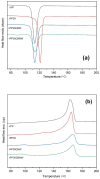Towards a Circular Economy: Study of the Mechanical, Thermal, and Electrical Properties of Recycled Polypropylene and Their Composite Materials
- PMID: 36559849
- PMCID: PMC9781673
- DOI: 10.3390/polym14245482
Towards a Circular Economy: Study of the Mechanical, Thermal, and Electrical Properties of Recycled Polypropylene and Their Composite Materials
Abstract
This research focuses on the mechanical properties of polypropylene (PP) blended with recycled PP (rPP) at various concentrations. The rPP can be added at up to 40 wt% into the PP matrix without significantly affecting the mechanical properties. MFI of blended PP increased with increasing rPP content. Modulus and tensile strength of PP slightly decreased with increased rPP content, while the elongation at break increased to up to 30.68% with a 40 wt% increase in rPP content. This is probably caused by the interfacial adhesion of PP and rPP during the blending process. The electrical conductivity of materials was improved by adding carbon black into the rPP matrices. It has a significant effect on the mechanical and electrical properties of the composites. Stress-strain curves of composites changed from ductile to brittle behaviors. This could be caused by the poor interfacial interaction between rPP and carbon black. FTIR spectra indicate that carbon black did not have any chemical reactions with the PP chains. The obtained composites exhibited good performance in the electrical properties tested. Finally, DSC results showed that rPP and carbon black could act as nucleating agents and thus increase the degree of crystallinity of PP.
Keywords: carbon black; mechanical properties; plastic waste; polypropylene; sustainability.
Conflict of interest statement
The authors declare no conflict of interest.
Figures











References
-
- Kameel N.I.A., Daud W.M.A.W., Patah M.F.A., Zulkifli N.W.M. Influence of reaction parameters on thermal liquefaction of plastic wastes into oil: A review. Energy Convers. Manag. X. 2022;14:100196. doi: 10.1016/j.ecmx.2022.100196. - DOI
-
- Râpă M., Spurcaciu B.N., Ion R.-M., Grigorescu R.M., Darie-Niță R.N., Iancu L., Nicolae C.-A., Gabor A.R., Matei E., Predescu C. Valorization of Polypropylene Waste in the Production of New Materials with Adequate Mechanical and Thermal Properties for Environmental Protection. Materials. 2022;15:5978. doi: 10.3390/ma15175978. - DOI - PMC - PubMed
-
- Zhao X., Korey M., Li K., Copenhaver K., Tekinalp H., Celik S., Kalaitzidou K., Ruan R., Ragauskas A.J., Ozcan S. Plastic waste upcycling toward a circular economy. Chem. Eng. J. 2021;428:131928. doi: 10.1016/j.cej.2021.131928. - DOI
LinkOut - more resources
Full Text Sources
Miscellaneous

